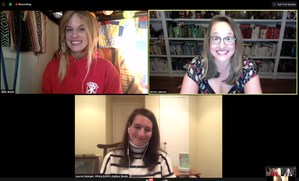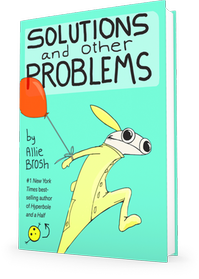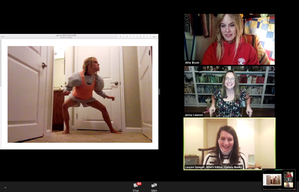
|
|
| Clockwise from top left: Allie Brosh, Jennie Lawson, Lauren Spiegel | |
During the closing national regional booksellers association keynote event held over Zoom on Wednesday night, authors Jenny Lawson (Furiously Happy)--who also owns Nowhere Bookshop in San Antonio, Tex.--and Allie Brosh discussed Brosh's new book, Solutions and Other Problems (Gallery Books), Brosh's writing process, their reclusive natures, how they handle making art amid depression and much more. Mary Laura Philpott, former indie bookseller and author of I Miss You When I Blink, introduced the pair, and Lauren Spiegel, Brosh's editor, joined for the q&a portion of the talk.
Comparing Solutions and Other Problems to Hyperbole and a Half, Brosh said her new book explores "things you start to face in your 30s," such as feelings of powerlessness and hopelessness and confronting mortality. Despite the book's heavy themes, Brosh hopes readers feel uplifted after they finish the book.
 On the subject of her writing process, Brosh explained that every one of her stories begins with an image, as she "thinks in pictures," but she actually does the writing long before she starts drawing. If she started with the pictures first, she explained, she would end up wasting too much of her own time with all of the editing she would have to do later. She wrote a significant portion of the book, in fact, while on long, nighttime walks.
On the subject of her writing process, Brosh explained that every one of her stories begins with an image, as she "thinks in pictures," but she actually does the writing long before she starts drawing. If she started with the pictures first, she explained, she would end up wasting too much of her own time with all of the editing she would have to do later. She wrote a significant portion of the book, in fact, while on long, nighttime walks.
Brosh and Lawson also discussed their shared love of horror, with Brosh adding that she "learned a lot about comedy from horror." Both comedy and horror feel similar to her in that they both sometimes feel like a "defense mechanism for sensitive people," and a way of "proving to yourself that you can handle it."
 |
|
| Brosh showed some of the reference pictures she takes for her work | |
When asked about the extreme honesty on display in her work and why she decided to "let it all out there," Brosh doubted there was a single, definitive answer to that question. She noted that she's always had a desire to connect and communicate with people in that way, though she also acknowledged that earlier in her career, part of it may have come from a "drive for attention." Once she got that attention, however, it was a "very strange experience" for her, and it led in part to her realizing just how introverted she is. The motivation behind her honesty now, though, is very different. She values honesty in her work so much because when people respond to that work, they're "really responding to you."
Asked what she's been reading lately, Brosh said that she doesn't read a lot of fiction while writing, as another author's voice can interrupt the flow of her own writing. She does, however, read a lot of technical and scientific writing, and recommended Calculus, Better Explained by Kalid Azad. "That book changed my life," Brosh remarked.
After the discussion turned to how they are able to make art while dealing with depression, Brosh compared learning to live with depression to "learning how to take care of an animal," and cautioned that everyone experiences depression in their own way. But in her case, she creates playlists for specific moods and emotions, goes on lots of walks, and does a variety of journaling exercises. Lawson observed that when she's in the midst of depression, she doesn't "have the ability to write at all," and has had to learn to give herself permission to know "it's not going to happen." Brosh agreed, added that you have to "give yourself permission to not be feeling it," and said it's a "weird thing to be writing comedy" when you're feeling sad or numb or whatever else. --Alex Mutter

